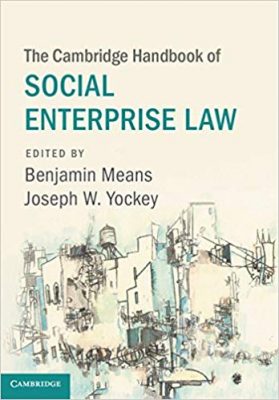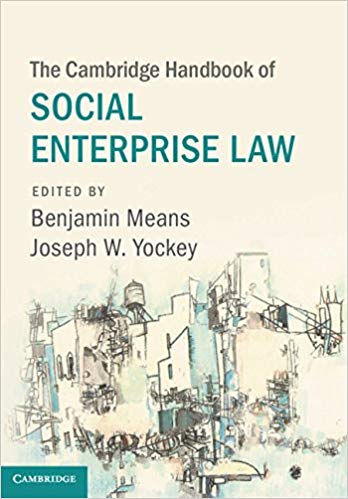 Editors: Benjamin Means and Joseph W. Yockey
Editors: Benjamin Means and Joseph W. Yockey
Publisher: Cambridge University Press – 449 pages
Book Review by: Sonu Chandiram
There are individuals and groups who want companies to do no harm of any kind – physical or mental – to consumers, or on a large scale, to society in general.
There are those who want to go a step further and actually do good for others (short of contributing sums of money to charities) such as promoting healthy eating, for example. It is kind of making a reality of their need to help people expressed in a statement such as this: “I want to do good for others but I also need to make a living for myself and my family.”
It has been shown in news media that some people view large corporations as motivated purely by greed, obsessed with making hundreds of millions of dollars in profits from consumers, with their managements having no regard about negative consequences, such as exacerbating the climate crisis, for example.
An effective way to do good, and to make a living, or even to make millions of dollars, is through social enterprises. I am referring to social media companies with large audiences: followers numbering in the hundreds of millions, or even billions of people.
But when such large numbers of audiences are involved, invariably, questions of individual rights arise, and sooner or later, issues such as the collection of various kinds of information (e.g. buying habits based on where they shop) on individuals and use or sales of such data, come to the fore. What are the legal rights of individuals, and in what instances have the social media companies violated those rights?
This book addresses many issues. Instead of going through many (or any) of them, we list below the titles of the chapters so that you the readers can pick and read the ones you want:
Introduction
- Part I – Theoretical Framework
- Social and Asocial Enterprise
- Self-Regulation of Social Enterprise
- Essential Policy and Practice Considerations for Facilitating Social Enterprise: Commitment, Connections, Harm, and Accountability
- Part II – Historical Context and Political Economy
- Three Legislative Paths to L3Cs, Benefit Corporations, and Second-Generation Cooperatives
- When All Enterprise Was Social: The Public Benefit Origins of the Corporate Form
- Early Lessons in Social Enterprise Law
- Shaping Corporate Reform: Social Enterprise, Cooperatives, and Mission-Led and Employee-Owned Business
- The Promise of Social Enterprise for Low-Income Communities
- Part III – Tax and Finance
- Creating a tax Space for Social Enterprise
- Impact investment and Alternate Corporate Channels: Funding Social Enterprise Success and Scale
- Financing Social Enterprise: Is Crowfunding the Answer?
- Social Enterprise Crowdfunding in New Zealand
- Part IV – Choice of Form
- The Social Enterprise Life Cycle
- Do We Need Specialized Business Forms for Social Enterprise
- Social Lock-in and the Corporate Form
- Using a Taxable Nonprofit Corporation for Social Enterprise
- Form Follows function: A Business Model Approach to Legal Structure Selection for Social Enterprise
- Part V- Fiduciary Obligation
- Fiduciary Duties in Social Enterprise
- Managerial Duties in Social Enterprise: The Public Benefit Corporation
- Judging the Public Benefit Corporation
- Part VI – Governance
- Stakeholder Representatives for Social Enterprise
- Mixed-Motive Investments and Agency Costs
- Some Implications of the Agency-Cost Theory of the Nonprofit Firm
- Preserving the Social Enterprise Mission
- A New Blueprint for Regulating Social Enterprises
This is a highly readable book on the business, legal, and regulatory aspects of social enterprises.
Editors:
Benjamin Means is a professor of law at the University of South Carolina School of Law. He teaches acquisitions and mergers, business associations, contracts, and family business law. His scholarship appears in journals including the Emory Law Journal, Georgetown Law Journal, Vanderbilt Law Review, and the Washington University Law Review.
He serves on the executive committee of the American Association of Law Schools’ Section on Business Associations. Professor Means practiced law at Davis, Park and Wardell LLP and Satterlee Stephens LLP, and he clerked for Judge Rosemary S. Pooler at the United States Court of Appeals for the Second Circuit.
Joseph W. Yockey is a professor of law and the Michael and Brenda Sandler Faculty Fellow in Corporate Law at the University of Iowa College of Law. He teaches courses on business associations, compliance, and higher education, and has been voted Law School Professor of the Year.
He writes extensively on social enterprise law and corporate governance Professor Yockey practiced litigation at Sidley Austin LLP in Chicago, Illinois, and he clerked for Judge John Daniel Tinder at the United States Court of Appeals for the Seventh Circuit, retired.







